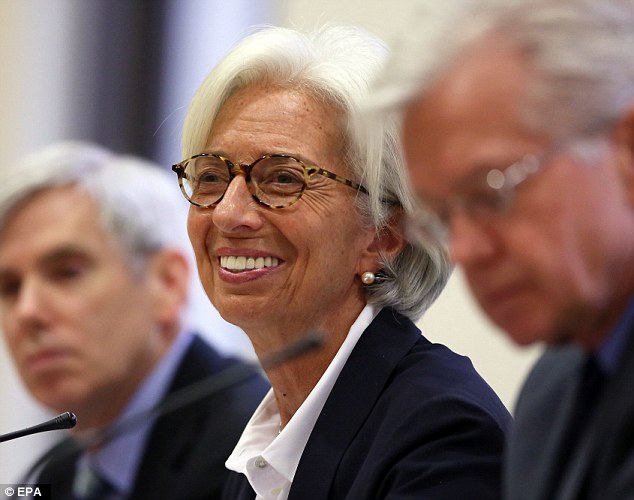Brexit uncertainty prompts IMF to downgrade UK growth forecast as chief Lagarde rebuffs doom-mongering claims
The International Monetary Fund has downgraded its outlook for economic growth across the UK this year, blaming Brexit uncertainty.
Led by Christine Lagarde, the IMF has reduced this year's growth forecast from 1.7 to 1.6 per cent.
Noting that growth in the UK has 'slowed notably' since the start of the year, Ms Lagarde said rising inflation was squeezing real incomes and hitting consumption levels.

Downgrade: Led by Christine Lagarde, the IMF has reduced this year's growth forecast from 1.7 to 1.6 per cent
Ms Lagarde urged the government to 'reach agreement soon' on the transitional arrangements that will apply for a set period of time after Brexit.
She said businesses are delaying investment decisions owing to uncertainty surrounding a number of key Brexit issues, such as trade in particular.
While the IMF dropped this year's UK growth forecast slightly, its prediction for a slower growth rate of 1.5 per cent next year remained unchanged.
Responding to the IMF's latest forecasts, Chancellor Philip Hammond said they underlined the need to avoid a 'cliff-edge' Brexit.
Speaking in London, Ms Lagarde said the government had made 'significant progress' in reducing the deficit.
But she added that relative to growth in the rest of the world, 'the UK is losing out as a result of higher inflation, pressure on wages and incomes and delayed investment.'
She said: 'If you look at investment alone, with 2.1% of GDP in investment, with the global economy as it is, and the space the UK economy has in that global economy, it should be rolling at 6%.'
Responding to criticism that the IMF had been too gloomy in its previous post-Brexit predictions, Ms Lagarade said: 'I don't think we are particularly gloomy about the UK economy.
'This was said a year and a half ago but regrettably the numbers we are seeing the economy deliver today are actually proving the point we made a year and a half ago when people said 'You are too gloomy, you are one of those experts'.
'Unfortunately we were not too gloomy. We were pretty much on the mark. Our forecasts actually turned out to be the reality of the economy.'
In November, the UK's fiscal watchdog, the Office for Budget Responsibility, cut its growth forecasts for the UK for the next few years.
Claiming the government will not be able to get rid of the deficit until 2031, the OBR cut its growth forecast from 2 per cent to 1.5 per cent for this year, from 1.6 to 1.4 per cent in 2018 and from 1.7 per cent to 1.3 per cent in 2019.
Earlier this month, figures from the Office for National Statistics revealed that inflation climbed to 3.1 per cent in November.
In November, the Bank of England voted to increase interest rates for the first time in a decade, from 0.25 per cent to 0.5 per cent.
Last week, the bank voted to keep interest rates on hold at 0.5 per cent.
BANK OF ENGLAND TO CONFIRM PLANS ALLOWING EUROPEAN BANKS TO OPERATE AS NORMAL AFTER BREXIT
British banks will have to stick closely to EU rules on issues including bonus caps if they want to keep trading in Europe after Brexit, it will be ruled today.
The European Commission is due to set out its terms for allowing the City of London to continue as the EU's leading financial centre after Brexit.
Brussels will demand equivalence with EU standards - a solution that could allow Britain to leave the single market while letting the City keep working.
In return, the Bank of England announced today it would allow European banks to carry on in London without setting up a new subsidiary even if there is no Brexit deal.
The central bank said it made the decision on the assumption that a 'high degree of supervisory cooperation with the EU' would continue after Britain leaves the bloc.